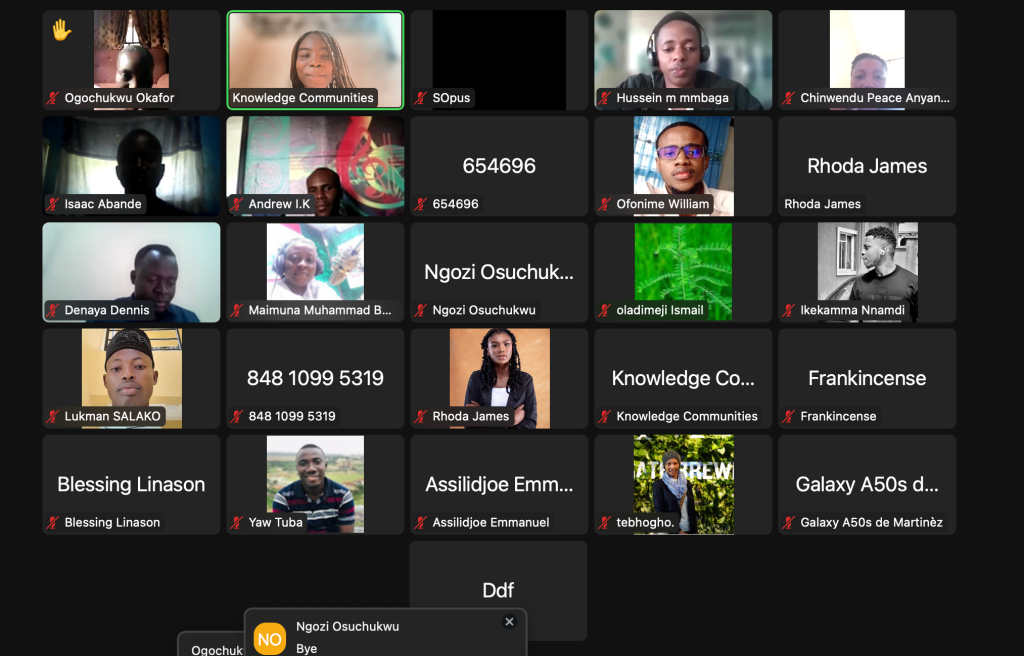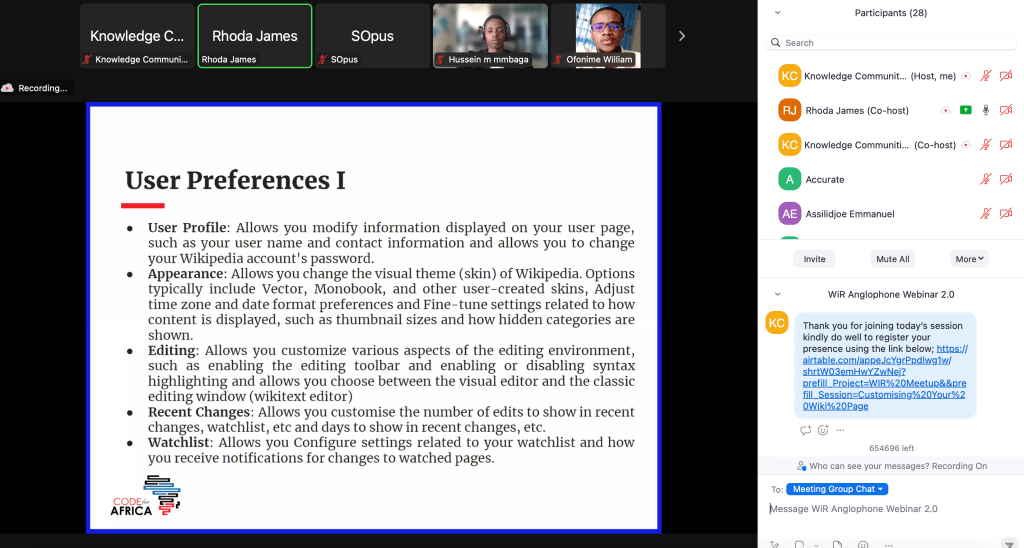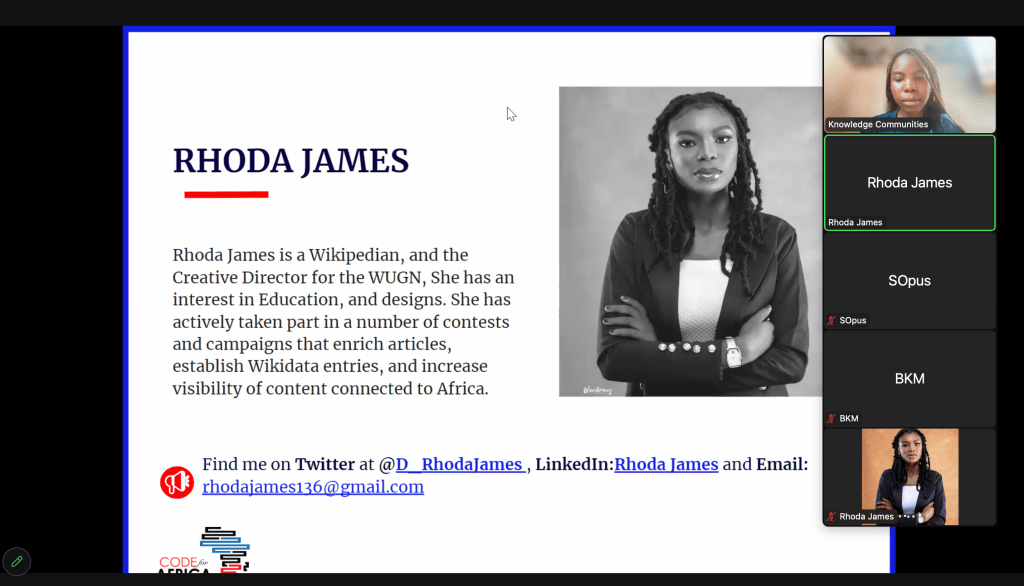
The Wikimedia ecosystem, with its sprawling array of platforms and projects, offers immense avenues for open access to information, knowledge sharing, and community engagement among Wikimedians. Recognising the importance of setting user preferences across different Wikimedia projects for editors’ efficiency and its pivotal role in enriching user experience and engagement, our community held a comprehensive webinar on the 20th of September 2023 as part of the Code For Africa Wikipedian in Residence bi-weekly webinar 2.0 themed “Customising Your Wiki Page”, the session was aimed at providing attendees with a deep dive into mastering the art of customisation across Meta, Wikipedia, and Wikidata. The session was facilitated by Bukola James, the CfA’s WiR community coordinator and the training was led by Rhoda James.

Pan-African Attendance
The session was attended by 29 African Wikimedians across 6 African countries, namely; Ghana, Nigeria, Rwanda, South Sudan, Tanzania, and Uganda and they remained engaged till the end of the session which served as a testament to the relevance and effectiveness of the session’s content.
A Deep Dive with Rhoda James our Trainer
Leading the session was Rhoda James, a Wikipedian and the Creative Director for the Wikimedia User Group Nigerian (WUGN) with a keen interest in education and design. She walked the participants through the presentation by introducing Wikipedia, Wikidata, and Meta-Wiki as three(3) distinct but interconnected projects operated by the Wikimedia Foundation. Furthermore, she explained the user interfaces of each project, the embedded customising tools, and sub-tabs within the user preferences with a practical demo on how they can be activated.

Session Breakdown
Understanding the Ecosystem:
Wikipedia: Wikipedia, is widely recognised as one of the largest free online encyclopaedias, that has revolutionised the way we access and share knowledge. Rooted in the principle of making information universally available, it provides free, trustworthy, and easily accessible content on an exhaustive array of subjects. These subjects span the vastness of human knowledge, from the annals of history and the intricacies of science to the ever-evolving realms of pop culture, arts, and individual biographies. This vast open repository is continually enriched and maintained by a global community of volunteers. These contributors, both experts and enthusiasts alike, adhere to stringent editorial guidelines ensuring that the content remains neutral and is backed by verifiable sources. Such a community-driven approach not only democratises the creation and dissemination of information but also underscores Wikipedia’s commitment to fostering an unbiased and comprehensive knowledge platform

Wikidata: Wikidata emerges as a pivotal and centralised open data storehouse, meticulously structured to bolster a multitude of Wikimedia projects, notably Wikipedia. It is ingeniously architected to serve as a universal data reservoir, facilitating interoperability across diverse languages and Wikimedia initiatives. At its core, Wikidata is an intricate web of items and statements, each meticulously crafted to depict real-world entities, abstract concepts, and the multifaceted relationships that interlink them. Whether it’s documenting celebrated personalities, landmark events, significant places, or any other notable entity, Wikidata captures these with granular details and interrelationships. It systematically categorises and annotates these data points, ensuring they are easily retrievable and integrable across the Wikimedia universe. This structured approach underscores Wikidata’s ambition to be the linchpin for data-driven content across Wikimedia platforms.

Meta-Wiki: Meta-Wiki, functioning under the Wikimedia umbrella, is not just another platform but is the nerve centre for collaboration, communication, and coordination for the expansive Wikimedia movement. It offers a dedicated space for Wikimedians from all walks of life to deliberate on policies, propose new projects, and collectively chart the future trajectory of Wikimedia ventures. Unlike Wikipedia, which is content-focused, or Wikidata, which is data-centric, Meta-Wiki prioritises the human elements of the movement: the discussions, the consensus-building, and the shared vision. It also serves as a repository for vital documentation, detailing the inner workings, guidelines, and foundational principles of various Wikimedia projects. Moreover, Meta-Wiki offers insights into the Wikimedia Foundation, its myriad initiatives, and outreach activities. In essence, Meta-Wiki is the collaborative heart of Wikimedia, fueling its mission and fostering its community-driven spirit.
Delving into Customisation Tools:
- User Profile: Enables personalisation of user display information and offers password change options.
- Appearance: Provides thematic customisations, adjustments to time zones, date formats, and display settings including content visibility toggles.
- Editing: Optimises the editing environment through toolbars, syntax highlighting, and editor options.
- Recent Changes: Facilitates customised view of recent edits and modifications.
- Watchlist: Provides configuration options related to watchlisted items and associated notifications.
- Gadgets: Offers user interface enhancements and tools, including citation tools and advanced search.
- Search: Personalised the number of search results displayed.
- Banner: Facilitates customisation of display announcements relevant to the Wikimedia communities.
- Beta features: An avenue to explore and opt for experimental features under testing.
- Notifications: Streamlines notification settings for different Wikipedia events.

Hands-On Practical Session: During the demo session, the lead trainer provided the participants with practical experience to learn how to tailor their preferences on Wikipedia, Wikidata, and Meta-Wiki. This segment involved:
- Logging into respective platforms and switching to desktop view.
- Navigating to the preferences tab to explore and modify user settings.
- Real-time visual aids, including images of the Meta-Wiki interface and instructional videos, further enriched this segment. The videos showcased procedures for setting preferences on Meta-Wiki, Wikipedia, and Wikidata.
For a more comprehensive understanding of the session’s content, the presentation is accessible here . All videos on Wikipedia, Wikidata, and Meta-Wiki customisations are on this drive.
Empowering Wikimedians
The session’s primary takeaway was clear: Customising one’s Wiki page, not only streamlines the user experience but also adds a personal touch, reflecting individual contributions and preferences. By the end, attendees were equipped with the tools and insights to enhance their user interfaces, making them more reflective of their unique journeys within the Wikimedia ecosystem.
Feedbacks from Participants
“A great informational session…”
Deneya Dennis
“It’s always amazing to learn basic steps on customising my wikimedia…”
Romeo Ronaldo
“We needed this indeed. I need more practice in this. So crucial…”
Onwuka Glory
“Very interesting and educative”…
Emmanuel Assidjoe
“It is an interesting exposure to the Wikipedia page. How to select our preference etc…”
Okafor Ogochukwu
For those who want a recap or missed out, a recorded version of the webinar, along with the presentation, is available on our community programmes page. Stay tuned for more insightful sessions as part of the CfA WiR Bi-weekly series, and join our ever-growing community in shaping the future of the Wikimedia landscape.

Can you help us translate this article?
In order for this article to reach as many people as possible we would like your help. Can you translate this article to get the message out?
Start translation